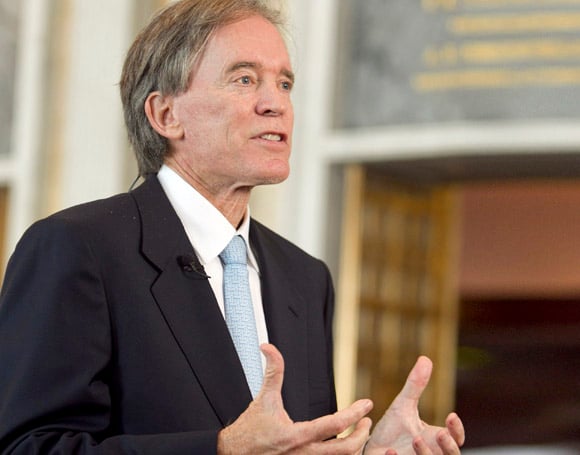Bill Gross, who runs the world's biggest bond fund at Pacific Investment Management Co., said gains in so-called headline inflation matter more for the U.S. economy than Federal Reserve Chairman Ben S. Bernanke suggests.
Bill Gross, who runs the world's biggest bond fund at Pacific Investment Management Co., said gains in so-called headline inflation matter more for the U.S. economy than Federal Reserve Chairman Ben S. Bernanke suggests.
Rising oil prices may cut U.S. gross domestic product by a quarter to half a percentage point, Gross said in a radio interview on “Bloomberg Surveillance” with Tom Keene.
Surges in oil and other commodity prices probably won't cause a permanent increase in broader inflation and borrowing costs are likely to stay low, Bernanke said March 1 in his semi- annual monetary policy testimony before Congress. Gasoline advanced to a 30-month high today as political unrest in Libya and the Middle East escalated, threatening global oil shipments, and an increase in U.S. jobs indicated higher demand.
“Bernanke tends to think this doesn't matter -- at least in terms of headline versus the core -- we do,” Gross said. “For the last 10 years, with the exception of maybe a year or two recently, the headline has averaged about 0.5 percent more than the core and that's because basically we've seen a shift based on globalization to increased commodity demand.”
Gross cut the holdings of U.S. government and related debt in Pimco's $237 billion Total Return Fund in January to the smallest proportion in two years. The securities were cut to 12 percent of assets, from 22 percent in December. He reiterated today that investors should reduce holdings of Treasuries and U.K. gilts and buy higher-returning securities such as debt from emerging-market nations and corporate bonds as central banks keep borrowing rates low.
Treasury Yields
Ten-year Treasury yields have risen for each of the past six months, according to data compiled by Bloomberg, the longest run since June 2006, as the economy showed signs of improvement and prices of commodities climbed.
Treasury yields are about 150 basis points too low when viewed on a historical context and when compared with expected nominal GDP growth of 5 percent with the Fed scheduled to end its asset purchases in June, Gross wrote in a monthly investment outlook posted March 2 on the Newport Beach, California-based company's website.
The Treasury 10-year note's yield fell four basis points to 3.51 percent today as investors sought a refuge from the turmoil in the Middle East.
Consumer Prices
The consumer-price index increased 0.4 percent for a second month in January, exceeding the 0.3 percent median estimate of economists surveyed by Bloomberg News, figures from the Labor Department showed Feb. 17. The so-called core rate, which excludes volatile food and fuel costs, rose 0.2 percent, the biggest gain since October 2009.
“The core basically assumes you revert to the mean level of demand,” Gross said. “But when that demand curve shifts up based upon globalization in emerging market economies you have a difference.”
Crude oil for April delivery increased as much as $2.18, or 2.1 percent, to $104.09 a barrel on the New York Mercantile Exchange. The contract is heading for a 5.2 percent gain this week, and is up 28 percent from a year ago.
U.S. employers added 192,000 workers in February, amid an improving economy and more seasonable weather, and the unemployment rate unexpectedly declined to 8.9 percent, the lowest level since April 2009.
The gain in payrolls followed a 63,000 increase in January and compared with the 196,000 median estimate of economists surveyed by Bloomberg News, Labor Department figures showed today in Washington. Employment rose in manufacturing, construction and temporary help agencies, while state and local government payrolls slumped.
Bloomberg







